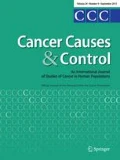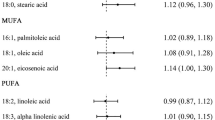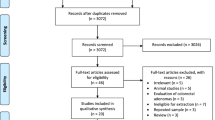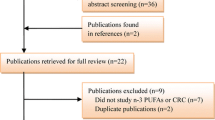Abstract
Recently, the potential health effects of trans-fatty acid consumption have raised concerns. A few studies have examined the risk of colorectal cancer with increasing consumption of trans-fatty acids, but none investigated the risk of rectal cancer, which may have different risk factors than colon cancer. Our objective was to explore the relationship between trans-fatty acid consumption and distal colorectal (sigmoid, rectosigmoid, and rectal) cancer using a case–control study of Whites (n = 1,516) and African Americans (n = 392) in North Carolina from 2001 to 2006. Matched cases and controls were interviewed about demographic information, lifestyle factors, and diet. White cases reported higher mean consumption of trans-fatty acid than White controls, but mean consumption was similar for African American cases and controls. Relative to the lowest quartile, the highest quartiles of energy-adjusted trans-fatty acid consumption were positively associated with distal colorectal cancer for Whites [adjusted ORs for the third and fourth quartiles are 1.54 (95%CI: 1.12, 2.13) and 1.45 (95%CI: 1.04, 2.03), respectively]. Consumption was not associated with distal colorectal cancer in African Americans [adjusted ORs for the third and fourth quartiles are 0.98 (95%CI: 0.47, 2.05) and 0.87 (95%CI 0.42, 1.81), respectively]. In conclusion, high consumption of trans-fatty acids was positively associated with distal colorectal cancer among Whites.
Similar content being viewed by others
References
Jemal A, Siegel R, Ward E, Murray T, Xu J, Thun MJ (2007) Cancer statistics, 2007. CA Cancer J Clin 57:43–66
World Cancer Research Fund/American Institute for Cancer Research (2007) Food, nutrition, physical activity, and the prevention of cancer: a global perspective. AICR, Washington, DC
Franco A, Sikalidis AK, Solis Herruzo JA (2005) Colorectal cancer: influence of diet and lifestyle factors. Rev Esp Enferm Dig 97:432–448
Giovannucci E (2003) Diet, body weight, and colorectal cancer: a summary of the epidemiologic evidence. J Womens Health (Larchmt) 12:173–182
Giovannucci E, Goldin B (1997) The role of fat, fatty acids, and total energy intake in the etiology of human colon cancer. Am J Clin Nutr 66:1564S–1571S
Howe GR, Aronson KJ, Benito E et al (1997) The relationship between dietary fat intake and risk of colorectal cancer: evidence from the combined analysis of 13 case–control studies. Cancer Causes Control 8:215–228
Kushi L, Giovannucci E (2002) Dietary fat and cancer. Am J Med 113:63S–70S
Slattery ML, Potter JD, Duncan DM, Berry TD (1997) Dietary fats and colon cancer: assessment of risk associated with specific fatty acids. Int J Cancer 73:670–677
Odegaard AO, Pereira MA (2006) Trans fatty acids, insulin resistance, and type 2 diabetes. Nutr Rev 64:364–372
Zaloga GP, Harvey KA, Stillwell W, Siddiqui R (2006) Trans fatty acids and coronary heart disease. Nutr Clin Pract 21:505–512
Bakker N, Van’t Veer P, Zock PL (1997) Adipose fatty acids and cancers of the breast, prostate and colon: an ecological study. EURAMIC Study Group. Int J Cancer 72:587–591
Lin J, Zhang SM, Cook NR, Lee IM, Buring JE (2004) Dietary fat and fatty acids and risk of colorectal cancer in women. Am J Epidemiol 160:1011–1022
Nkondjock A, Shatenstein B, Maisonneuve P, Ghadirian P (2003) Assessment of risk associated with specific fatty acids and colorectal cancer among French-Canadians in Montreal: a case–control study. Int J Epidemiol 32:200–209
Theodoratou E, McNeill G, Cetnarskyj R et al (2007) Dietary fatty acids and colorectal cancer: a case–control study. Am J Epidemiol 166:181–195
Slattery ML, Benson J, Ma KN, Schaffer D, Potter JD (2001) Trans-fatty acids and colon cancer. Nutr Cancer 39:170–175
Vinikoor LC, Satia JA, Schroeder JC et al (2009) Associations between trans fatty acid consumption and colon cancer among whites and African Americans in the North Carolina colon cancer study I. Nutr Cancer 61:427--436
Limburg PJ, Liu-Mares W, Vierkant RA et al (2008) Prospective evaluation of trans-fatty acid intake and colorectal cancer risk in the Iowa Women’s Health Study. Int J Cancer 123:2717–2719
Pischon T, Lahmann PH, Boeing H et al (2006) Body size and risk of colon and rectal cancer in the European prospective investigation into cancer and nutrition (EPIC). J Natl Cancer Inst 98:920–931
Huncharek M, Muscat J, Kupelnick B (2009) Colorectal cancer risk and dietary intake of calcium, vitamin D, and dairy products: a meta-analysis of 26, 335 cases from 60 observational studies. Nutr Cancer 61:47–69
Jarvinen R, Knekt P, Hakulinen T, Aromaa A (2001) Prospective study on milk products, calcium and cancers of the colon and rectum. Eur J Clin Nutr 55:1000–1007
Slattery ML (2004) Physical activity and colorectal cancer. Sports Med 34:239–252
Friedenreich C, Norat T, Steindorf K et al (2006) Physical activity and risk of colon and rectal cancers: the European prospective investigation into cancer and nutrition. Cancer Epidemiol Biomarkers Prev 15:2398–2407
Satia-Abouta J, Galanko JA, Potter JD, Ammerman A, Martin CF, Sandler RS (2003) Associations of total energy and macronutrients with colon cancer risk in African Americans and Whites: results from the North Carolina colon cancer study. Am J Epidemiol 158:951–962
Weinberg CR, Sandler DP (1991) Randomized recruitment in case–control studies. Am J Epidemiol 134:421–432
Ainsworth BE, Haskell WL, Whitt MC et al (2000) Compendium of physical activities: an update of activity codes and MET intensities. Med Sci Sports Exerc 32:S498–S504
Blair SN, Haskell WL, Ho P et al (1985) Assessment of habitual physical activity by a seven-day recall in a community survey and controlled experiments. Am J Epidemiol 122:794–804
Richardson MT, Ainsworth BE, Jacobs DR, Leon AS (2001) Validation of the Stanford 7-day recall to assess habitual physical activity. Ann Epidemiol 11:145–153
Subar AF, Thompson FE, Kipnis V et al (2001) Comparative validation of the Block, Willett, and National Cancer Institute food frequency questionnaires: the eating at America’s Table Study. Am J Epidemiol 154:1089–1099
Thompson FE, Subar AF, Brown CC et al (2002) Cognitive research enhances accuracy of food frequency questionnaire reports: results of an experimental validation study. J Am Diet Assoc 102:212–225
Subar AF, Midthune D, Kulldorff M et al (2000) Evaluation of alternative approaches to assign nutrient values to food groups in food frequency questionnaires. Am J Epidemiol 152:279–286
Dixon LB, Zimmerman TP, Kahle LL, Subar AF (2003) Adding carotenoids to the NCI Diet History Questionnaire Database. J Food Comp Anal 16:269–280
Willett W, Stampfer MJ (1986) Total energy intake: implications for epidemiologic analyses. Am J Epidemiol 124:17–27
Baron JA, Sandler RS (2000) Nonsteroidal anti-inflammatory drugs and cancer prevention. Annu Rev Med 51:511–523
Mozaffarian D, Pischon T, Hankinson SE et al (2004) Dietary intake of trans fatty acids and systemic inflammation in women. Am J Clin Nutr 79:606–612
Vinikoor LC, Schroeder JC, Millikan RC et al (2008) Consumption of trans-fatty acid and its association with colorectal adenomas. Am J Epidemiol 168:289–297
McKelvey W, Greenland S, Chen MJ et al (1999) A case–control study of colorectal adenomatous polyps and consumption of foods containing partially hydrogenated oils. Cancer Epidemiol Biomarkers Prev 8:519–524
McKelvey W, Greenland S, Sandler RS (2000) A second look at the relation between colorectal adenomas and consumption of foods containing partially hydrogenated oils. Epidemiology 11:469–473
Colandre ME, Diez RS, Bernal CA (2003) Metabolic effects of trans fatty acids on an experimental dietary model. Br J Nutr 89:631–639
Kuhnt K, Wagner A, Kraft J, Basu S, Jahreis G (2006) Dietary supplementation with 11trans- and 12trans-18:1 and oxidative stress in humans. Am J Clin Nutr 84:981–988
O’Keefe SJ (2008) Nutrition and colonic health: the critical role of the microbiota. Curr Opin Gastroenterol 24:51–58
Reddy BS, Simi B, Patel N, Aliaga C, Rao CV (1996) Effect of amount and types of dietary fat on intestinal bacterial 7 alpha-dehydroxylase and phosphatidylinositol-specific phospholipase C and colonic mucosal diacylglycerol kinase and PKC activities during stages of colon tumor promotion. Cancer Res 56:2314–2320
Riserus U (2006) Trans fatty acids and insulin resistance. Atheroscler Suppl 7:37–39
Bruce WR, Giacca A, Medline A (2000) Possible mechanisms relating diet and risk of colon cancer. Cancer Epidemiol Biomarkers Prev 9:1271–1279
Lee DY, Lupton JR, Aukema HM, Chapkin RS (1993) Dietary fat and fiber alter rat colonic mucosal lipid mediators and cell proliferation. J Nutr 123:1808–1817
Department of Health and Mental Hygiene Board of Health (2006) Notice of adoption of an amendment (§81.50) to article 81 of the New York City Health Code
Okie S (2007) New York to trans fats: you’re out!. N Engl J Med 356:2017–2021
Food and Drug Administration (2003) Federal register, food labeling; trans fatty acids in nutrition labeling; consumer research to consider nutrient content and health claims and possible footnote or disclosure statements; final rule and proposed rule. National Archives and Records Administration 68:41433–41506
Acknowledgments
Grant support was received from the National Institutes of Health (P30DK34987, R01CA66635, T32DK07634).
Author information
Authors and Affiliations
Corresponding author
Rights and permissions
About this article
Cite this article
Vinikoor, L.C., Millikan, R.C., Satia, J.A. et al. trans-Fatty acid consumption and its association with distal colorectal cancer in the North Carolina Colon Cancer Study II. Cancer Causes Control 21, 171–180 (2010). https://doi.org/10.1007/s10552-009-9447-3
Received:
Accepted:
Published:
Issue Date:
DOI: https://doi.org/10.1007/s10552-009-9447-3




